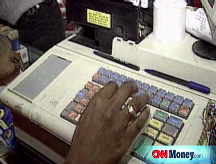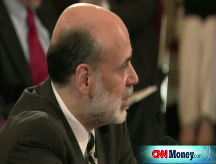Fed debated need for rate hikes
Minutes from the central bank's meeting in June showed that some Fed members believed interest rate increases were needed 'very soon' in order to curb inflation.

NEW YORK (CNNMoney.com) -- Some Federal Reserve policymakers said late last month that they believed interest rate hikes would be needed "very soon" to combat inflation, according to minutes of the Fed's last meeting.
The minutes, released Wednesday, do not identify who was pushing for the Fed to start raising rates. But only one member of the central bank's rate setting body, Dallas Fed President Richard Fisher, voted to raise rates at that meeting.
The Fed held its key federal funds rates steady at 2% following last month's two-day meeting.
The minutes show that members felt caught between the dual mandate to promote growth through low interest rates and to try to keep inflation in check by raising rates.
This suggests that interest rates could stay at current levels for an extended period of time.
"In the view of most members, the outlook for both economic activity and price pressures remained very uncertain, and thus the timing and magnitude of future policy actions was quite unclear," the minutes said.
The June meeting was the first time in nine months that the central bank did not cut interest rates. At that time, there was a growing sense that the Fed would soon begin raising rates as an attempt to strengthen the dollar and put an end to the spike in surging commodity prices, most notably oil.
According to the minutes, members indicated that the next change in rates could be an increase because of inflation fears.
"Strong increases in energy and other commodity prices would prompt a difficult adjustment process involving both lower growth and higher rates of inflation in the near term," the minutes said.
But the Fed may now be less eager to raise rates at its next meeting on August 5 -- or even signal that any rate hikes are imminent -- due to economic problems that have cropped up in the past few weeks.
The Fed had slashed interest rates seven times since last September in an effort to spur economic growth and prop up a troubled financial services sector.
Since the Fed's last meeting, fears about the credit crunch not being over returned with a vengeance.
Stocks of some top financial firms, particularly government-sponsored mortgage finance firms Fannie Mae (FNM, Fortune 500) and Freddie Mac (FRE, Fortune 500), have plunged on investor worries about their need to raise capital to cover future losses.
The Fed and the Treasury Department announced a rescue plan this past Sunday which included letting the firms borrow money directly from the New York Fed if needed.
Besides the problems with Fannie and Freddie, the collapse of IndyMac, the largest bank failure in 20 years, has prompted concerns about the outlook for a number of major banks.
John Silvia, chief economist with Wachovia, said he thinks the Fed was set to raise rates as soon as its September meeting when it met last month. But he believes the Fed will now leave rates unchanged until 2009.
"I think they were caught off guard," he said. "There was discussion about inflation as a concern but with what they've seen since from Fannie and Freddie, I don't think they're going to be able to pursue their inflation goals."
This week, Fed Chairman Ben Bernanke gave a much gloomier outlook for the economy for the remainder of this year, telling Congressional committees that financial markets remain under stress and that there is a risk of an even deeper housing contraction in the housing market.
This marked a change from the official statement the Fed released after last June's meeting. In that statement, the Fed said that the downside risks to the economy "appear to have diminished somewhat."
But the minutes showed that Fed members were still very concerned about the economy's sluggish state. A staff forecast of a "slight slowdown in growth" in the next six months was presented to policymakers.
And the discussion showed most members believed that "the outlook for the housing market remained bleak."
But inflation hasn't gone away. That further complicates matters for the Fed.
On Wednesday, the government reported that its key inflation measure, the Consumer Price Index, showed the biggest year-over-year jump in retail prices in 17 years. Prices rose 5% over the past year through June. ![]()




